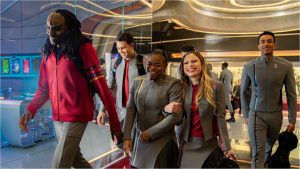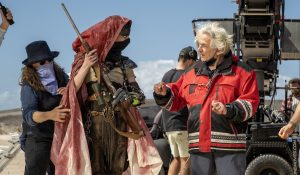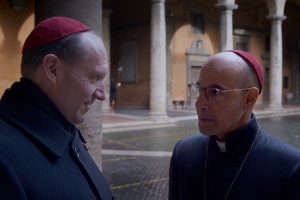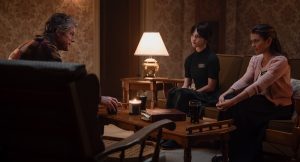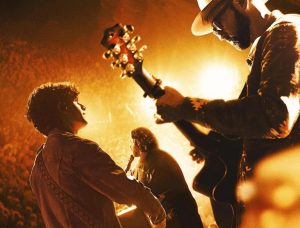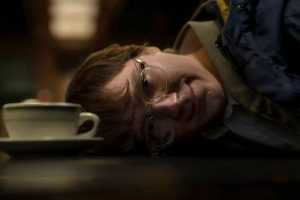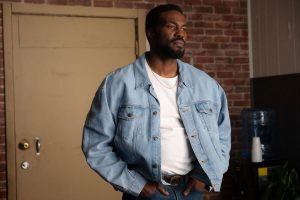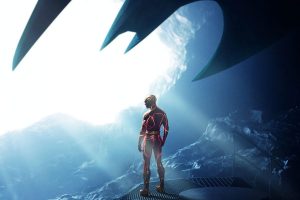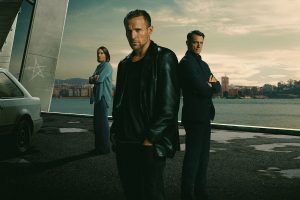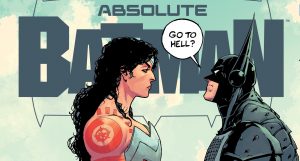
Like anyone else who’s enjoyed a superhero movie in the last 25 years, Ryan Reynolds is having a moment this week. Only for him, it is obviously much more so. An actor who appeared in multiple iterations of the genre’s earliest days in the 21st century—being at one time pegged as Green Lantern, Wade Wilson, and of course vampire hunter extraordinaire Hannibal King in New Line Cinema’s Blade franchise—Reynolds has seen the highs and lows of superhero cinema, and was rewarded for that enduring affection via the biggest hit of his career.
Deadpool & Wolverine is indeed a bemused, somewhat mocking, and ultimately earnest tribute to this genre’s most mercurial days in the early 2000s, back when Sony made their own Spider-Man movies, X-Men thrived at 20th Century Fox, 20th Century Fox for that matter existed, and no one but dedicated comic book readers knew who Tony Stark was. And with D&W earning a gargantuan $211 million in its first weekend, it seems Reynolds and his co-star Hugh Jackman were right to surmise audiences were nostalgic too. Hence Reynolds’ below post.
“This isn’t just Deadpool saying ‘Oh, Hello’ to the MCU,’” Reynolds wrote online after that massive weekend. “It’s Deadpool – and Hugh, Shawn [Levy], and me – saying farewell to a place and an era that literally made us. We are forever grateful to the fun, weird, uneven and risky world of 20th Century Fox. It was our origin story and we wouldn’t trade it for anything. And thank you to Kevin Feige and Disney for allowing us to share it.”
It’s a sweet sentiment for a movie that, whatever narrative flaws one might pick out, is remarkably magnanimous to a studio and legacy quite separate from the one Feige and Disney carved out with the Marvel Cinematic Universe. Nonetheless, I cannot help but notice that even while eulogizing the X-Men movies and superhero genre that once was, Reynolds felt the need to point out that the Fox era was “weird and uneven,” in addition to being “fun and risky.” While most of the laughs in Deadpool & Wolverine came from underlining the former, it is the latter that I think deserves a far louder toast and cheers these days.
For those a bit younger, the ending of Deadpool & Wolverine, where every aspect of the superhero genre produced by Fox, from the highest of highs (Logan) to the lowest of lows (any of the Fantastic Four flicks) are mushed together in a BTS montage scored by Green Day, can make it seem like they’re all one in the same: brave and noble failures that were created before (or outside of) Marvel Studios’ enlightened arrival. It’s a salute to the Wild Wild West days of the genre, but also a prism that practically looks at them in sepia tone.
There is obviously a lot of truth to this. The superhero genre was unruly, far more inconsistent, and littered with bizarre and misbegotten swings before Marvel Studios showed Hollywood how much enthusiasm (and money) there was in consistently offering fandom what it wants. There were probably more bad superhero movies than good in the first decade of the 21st century. There was, though, also a dizzying amount of variety.
As someone who grew up in the ‘90s and early 2000s, comics will always be my preferred medium for these characters. There is just a lot more creative freedom in a monthly series versus a mega-franchise that at best puts out one blockbuster-priced movie every few years about any single character. However, what Marvel Studios has been very good at when it comes to adapting their own stories is capturing the variety of scale. Peter Parker works best when he is a young person—be it in high school, college, or right after—dealing with young person problems. Conversely, Captain America could operate on a geopolitical board, and the Avengers and Guardians of the Galaxy can go cosmic.
Yet while the MCU has miraculously duplicated the scope of comicdom—to the point where they’re now running into the same problems of creating a mythology so dense that it is losing casual fans—it has often sacrificed the tonal and creative variety that also made comics thrive. The aforementioned Spider-Man is your friendly neighborhood Web-Head, but he could be in a story as adult and emotionally layered as Kraven’s Last Hunt; and when Thor faces a villain called the “Gorr, the God-Butcher,” it is no laughing matter. Yet since about 2012, when Joss Whedon’s The Avengers became the first Marvel movie to cross $1 billion, a tonal template has been set, and only a handful of the subsequent 30 MCU movies have dared break it.
Marvel’s success stems from its relative consistency in quality, as well as in style, narrative, and formula.
In the 2000s there was no formula, at least not for franchises that got beyond that first movie, and certainly not for shared universes. Almost every superhero movie followed the origin story algorithm set down by Dick Donner’s Superman as if it were scripture—and that includes the first couple of Phase One MCU flicks—but after that… you were kind of on your own.
That freedom, both for filmmakers and perhaps their shortsighted studio executives, led to a lot of junk like the soulless and sitcom-y Fantastic Four flicks, and whatever the hell they thought they were going for in the 2004 Catwoman starring Halle Berry. However, it also led to franchises as vividly different as the Sam Raimi Spider-Man trilogy, Christopher Nolan’s The Dark Knight trilogy, Ang Lee’s mind-boggling Hulk swing, and, yes, the good and bad of the X-Men movies that trickled all the way into the late 2010s. Heck, the first Marvel movie after the candy-colored Spider-Man in 2002 was a Daredevil film wherein Elektra is brutally murdered and the hero smashes the knees of his arch-nemesis in extreme close-up.
It should be noted the most successful of these were also, like the MCU titles that came later, the ones that hewed closer to the spirit of the comics. In fact, there still hasn’t been a live-action Spider-Man more in line with Spidey’s golden age run under the stewardship of Stan Lee, Steve Ditko, and John Romita Sr. than the first two Raimi movies. Marvel shrewdly honed in on the few areas Raimi’s interpretation were found wanting—like Spidey’s sense of humor or general youthful exuberance—but when it comes to capturing the melodramatic soap opera of Peter Parker’s life? The Raimi movies were like mini-emotional epics, with Spider-Man 2 in particular turning into the type of neurotic New Yorker love story that might have played to raves in the Village during the ‘70s. The loss of Tobey Maguire’s powers in that movie became a metaphor for an urbanite’s existential crisis about the direction of his life—and his inability to perform when the woman he loves is marrying someone else.
The movie captures that with total conviction and then the kind of sudden bouts of manic energy, and sometimes mean-spirited violence, that are Raimi’s hallmarks. But we know from the rather divisive fan reaction to Raimi’s recent Marvel foray in Doctor Strange in the Multiverse of Madness, a movie far more muted in its authorial flourishes or adult-leaning touches than Raimi’s Spidey trilogy, that letting a director put that much transgressive personality into these movies has become a taboo.
But that trilogy is rather mild when compared to the level of creative freedom Nolan achieved by the time The Dark Knight opened in the same summer as the MCU’s first two pictures, Iron Man and The Incredible Hulk. The Dark Knight jettisons whole cloth elements fans once thought integral to these characters—be it by way of giving us a Joker in pancake makeup instead of chemically altered flesh, or a Batman eager to one day not be Batman—yet it retained the spirit of some of the most defining stories ever written about the Caped Crusader.
Batman: Year One, The Long Halloween, and The Killing Joke, among others, were all striking influences on The Dark Knight, and Nolan distilled them into an experience that was singularly cinematic and electric, especially whenever Heath Ledger’s smilex-free Joker came on-screen. In Nolan’s hands, Batman versus the Joker became as searing a cinematic allegory for the paranoia and moral ugliness that erupted in the post-9/11 years as any film actually about the War on Terror. It was both a drama about the state of America, and a definitive cinematic rendering of the elemental appeal of those characters. And it could live side-by-side in a genre that was also producing in the same year Iron Man and Guillermo del Toro’s Hellboy II: The Golden Army.
Letting auteurs have free hands with these characters did not always end well for fans or the film. Ang Lee turning Hulk into an Oedipal tragedy about fathers and sons, complete with said father (Nick Nolte) turning into a giant bubble at the end of a talky two and a half hour movie, satisfied no one in particular, including Lee. Even so, I’m not sure there has been a scene that better communicated the cathartic release of the Hulk’s rage than when he goes to town on a couple of tanks in the desert following a half hour of Bruce Banner (Eric Bana) and Betty Ross (Jennifer Connelly) somberly excavating his traumatic childhood memories.
And then there were the X-Men. One year after the MCU began, the worst film in the X-canon was released, X-Men Origins: Wolverine. This movie also happened to be our introduction to Ryan Reynolds as Deadpool… who then inexplicably had his mouth sewn shut.
The movie is a disaster, as well as a fascinating emblem of every single thing that could go wrong in this genre, especially at 20th Century Fox. Somehow, though, this abject and total failure led to Fox completely rethinking the X-Men and letting someone like Matthew Vaughn turn them into a Bondmania throwback that got to revisit these characters’ real-world ‘60s roots about 15 years before Marvel’s Fantastic Four: First Steps.
Fox’s eclectic, uneven, and yes even weird, internal machinations also led to the studio producing superhero movies as earnest about the LGBTQ connotations of mutanthood as X2: X-Men United, a movie that came out the same year that George W. Bush launched a successful presidential reelection campaign based on promising to constitutionally ban same-sex marriages. He didn’t, but for an alienated young audience in 2003, hearing Bobby Drake be asked, “Have you tried not being a mutant?” sent a viscerally uncomfortable chill down the spine.
Similarly, a year after Donald Trump got into the White House, the best X-film ever made, Logan, changed the X-23 character from a clone of Jackman’s Wolverine into his literal daughter: Laura is a little girl, now with a Mexican accent, who is being chased by white men with big guns across the border because they didn’t view her or other Latinx children as people. It’s not preachy; it’s not “virtue signaling;” it feels depressingly, urgently, real.
Fox’s careening studio sensibilities, which hung on well into the 2010s, even eventually gave us the proper Deadpool in 2016. It’s a movie that infamously would have probably never been made had its test footage not been leaked online. However, it is impossible to imagine that film, which features a scene of the title hero being pegged by his girlfriend while Neil Sadaka plays on the soundtrack, ever being greenlit under the Marvel/Disney system back then, leak or no leak.
The last remnants of the halcyon 2000s superhero days is why Disney found itself feeling obligated to make something as foul-mouthed and un-Disney-like as Deadpool & Wolverine. Those unwieldy days also gave us a lot of junk like Ghost Rider and Blade: Trinity. But they also gave us Blade II, Sin City, and a world where Christopher Nolan could make the best superhero movie ever. Frankly, the chaotic divergences in tone, and even quality, faintly resembles standing in front of a comic book rack and seeing all the competing voices and styles.
There is a consistency now that has made superheroes the most popular genre genre in the world, but it’s also defined that genre with hard lines and edges about what’s expected and allowed. So Reynolds is right. There is no shame in coming from that helter-skelter earlier era. In fact, there are some elements of those days to even miss.
The post Appreciating the Pre-MCU Superhero Movies of the 2000s appeared first on Den of Geek.
